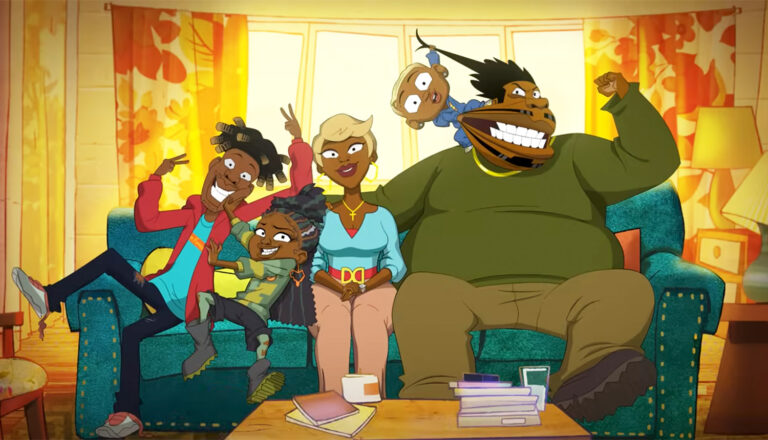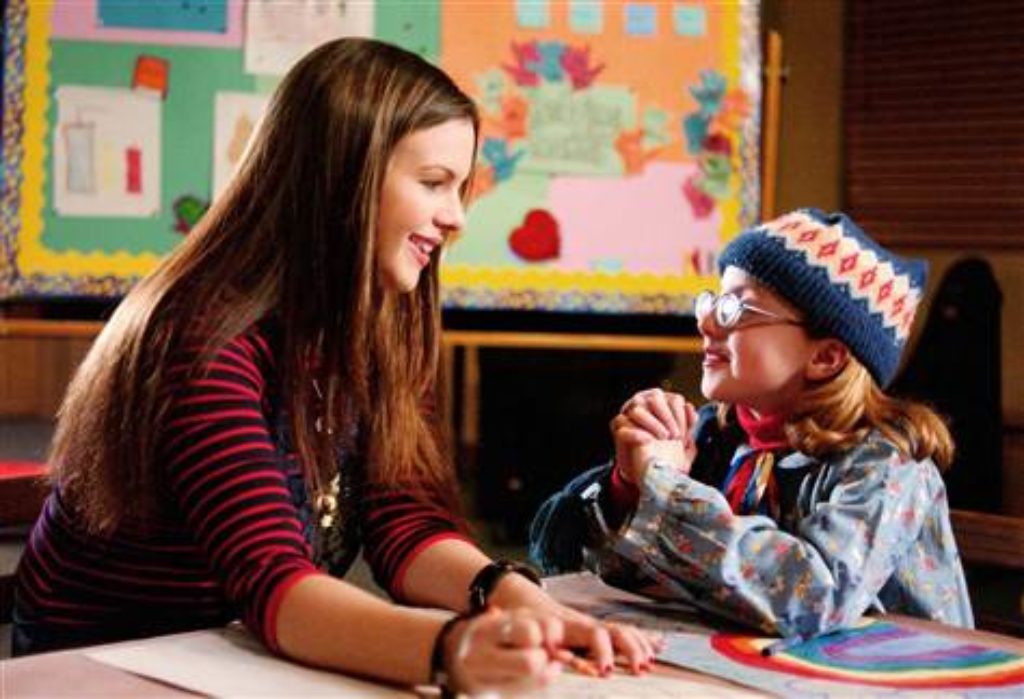
Good Times
Netflix takes a classic sitcom, Good Times, and turns it into a vulgar, violent, sexually-charged TV-MA show.

“The Lord had said to Abram, ‘Leave your country, your people and your father’s household and go to the land I will show you’” (Gen. 12:1). And so it was that God appeared to Abram—seemingly out of the blue—and gave him an inexplicable order. Three verses later, Scripture says, “Abram left, as the Lord had told him.”
Thousands of years later on CBS, “God” says to Joan, “Excuse me, don’t make me shriek. You need to have a garage sale on Saturday.” Three days later, Joan drags a bunch of junk out of her closets, dumps it on the lawn and sells it for ten cents on the dollar.
Sound silly? Well, what would you do if God showed up one day and told you to, say, build a boat? Or join the chess club? Or become a cheerleader? And what might He sound like?
Joan of Arcadia ponders exactly such a possibility and watches as God comes calling on an ordinary high school girl. The drama stars Amber Tamblyn as Joan; Joe Mantegna as her father, Police Chief Will Girardi; Mary Steenburgen as her mother, Helen, who happens to work at her school; Jason Ritter as her wheelchair-bound brother, Kevin; and Michael Welch as her book-smart brother, Luke. It is unquestionably the most water-cooler worthy series of the season.
Is Joan of Arc Back From the Dead?
There’s been much speculation about Joan of Arcadia’s thematic ties to the historical figure Joan of Arc, who led her armies into battle at God’s behest and carried on conversations with the Lord. Episode one hinted that 21st century Joan might be Joan of Arc reincarnated. But since then, nothing other than the show’s title has tied the two together. Executive producer and series creator Barbara Hall uses the historical heroine more as a point of inspiration than an avenue to develop plots.
“One of the reasons I’m interested in the Joan of Arc story is that it’s such a complex story because God didn’t ask her to go feed the poor,” Hall told a group of reporters during one of CBS’ summer press tours, “He asked her to put on armor and go into battle. And that is a complex issue. … I’m interested in God in sort of a bigger way and in a more complex way and a darker way.”
One reason Joan of Arcadia is such a hit with teens and adults alike is that it gives people something to talk about. Politics is what makes a series like The West Wing thrive. Religion is what propels Joan. But don’t look for any supernatural revelations. “I don’t think people tune in to be preached to, so we have nothing to preach,” Hall said, though the issues she tackles and the positions she takes will preach nonetheless. “I’m not going to supply the answers, but I do think these are interesting questions, and to have a show that would just kick off the conversation would be great.”
Ground Rules for God
To get that conversation started, Hall wrote down what she calls The Ten Commandments of Joan of Arcadia. They’re rules that shape God’s presence on her show. They prevent him from doing certain things, such as directly intervening in man’s affairs (this deity doesn’t simply avoid manipulating free will, he also refuses to perform miracles). They also give him freedoms, such as immunity from the restrictions of time and space. Some of Hall’s rules seem transcribed directly from Scripture (“Good and evil exist”). Others defy it (“God can never identify one religion as being right”).
Hall’s commandments are not merely a product of her creative mind; they’re part of her personal convictions. Understanding her values can help families forecast where she’ll steer her series. “It’s not just a matter of trying not to offend people,” she said. “It really has to do with my actual beliefs. … I can’t be removed from it. It has to come from a real psychological and philosophical place.” More specifically, Hall continues, “Part of my beliefs—my own spiritual beliefs and my belief approaching the show—come from science and physics. I’m kind of a physics buff and I read a lot about it. I actually told my writing staff they had to read these physics books, and they just kind of laughed. I had to go and say, ‘You really have to read these physics books.’ My tag on the show is that it’s about physics and metaphysics because you can’t have one without the other.”
What Viewers Have Seen So Far
God—who appears in various human forms—tells Joan she can choose to be his instrument for good. Then he appears to her on a semi-regular basis, offering suggestions as to what she might do to serve him. She is alternately incredulous, bewildered, combative and submissive. Mostly submissive. Her tone sometimes seems harsh and flippant (God dishes it back to her good-naturedly), and she even refuses to cooperate on occasion. But just as the good son does in Matthew 21:28-32, she always comes through in the end. Such ongoing obedience to God is rare in the real world, much less on TV. It provides an unexpected opportunity for parents to bounce off of it by teaching truths regarding our daily relationship with the Lord.
Police investigations provide entwined, yet distinct story lines (Joan won’t be helping her dad solve crimes). Chief Girardi models the virtues of honesty, trustworthiness and integrity. He’s a straight-arrow cop devoted to doing the right thing even when it seems counterproductive. He refuses to play politics to protect his position, tamper with police reports to sway court proceedings or cut corners just so his squad will accept him.
Likewise, scenes concentrating on Joan’s paraplegic brother are designed to inspire while maintaining the authenticity of conflicted emotions that follow a crippling accident. Helen lovingly asks her despondent son, “The day you came home, you asked me whether you would ever feel normal again. What did I say?” “‘Yes,’ you promised,” he glumly replies. “I intend to keep that promise,” she says, “no matter how hard you fight me, because nobody can stop me from keeping a promise to someone I love, not even the person I love.”
Joan of Arcadia obviously has a conscience, which automatically elevates it above much of what surrounds it in prime time. But it has succumbed to a few common flaws. Joan gets away with disrespecting her parents and rebuffs them with comments such as “Just back off” and “Ewww! Talking to your mother when you’re 16—even the good ones— it’s creepy.” One of her girlfriends at school is fond of calling parents maternal and paternal “units.” That friend, incidentally, is being set up as a foil for jokes and discussions about sexual preferences. Comments have already been made about her being a lesbian (she neither confirms nor denies it). Elsewhere, crime scenes aren’t as graphic as the ones on CSI, but the camera still catches glimpses of bloody corpses.
At a more spiritual level, Helen’s search for truth gets a chilly reception from an impatient priest annoyed by her questions about miracles. It is suggested that psychics may have a special window into the supernatural world. And while profanity is usually mild, God’s name is often used as a careless exclamation.
“Who Does CBS Say That I Am?”
Joan of Arcadia isn’t a teen drama. It isn’t a police drama. It isn’t a family drama. Although it has all of those elements, Joan of Arcadia is a God drama. It will live or die on TV based on how it portrays God, and how families either embrace or reject those depictions. What kind of God does it reveal? In Barbara Hall’s own words, a mysterious, magical force—if he exists at all. “We literally can never answer whether or not God exists or what God is up to. It’s clear to me that no one knows; I can’t presume to know. … Part of God is that he is, or she is, a mystery. And it’s part of my Joan of Arcadia rules that the mystery can never be solved.”
Slate’s Austin Bunn wrote of the show’s spiritual ambiguity, “Joan’s idea of morality is a clueless stumble toward self-actualization, a chaos-theory Samaritanism. … It’s a message perfectly tuned for audiences interested in spirituality but annoyed by What Would Jesus Do? smugness, do-gooder screenagers, or the confidence that we have much agency at all.” Not an encouraging sign.
Does God speak to teens? Absolutely. Which is why young people need to be sensitive to fundamental differences between the God of Scripture and Joan of Arcadia’s wishy-washy, nonjudgmental deity. When Christians sense God speaking, we have an inerrant, God-breathed source to help us determine where those voices are coming from: The Bible. He will not contradict His word. But since Hall’s god doesn’t differentiate between faiths, he/she/it is accountable to no objective, authoritative text. No transcendent, absolute truth. In essence, Joan’s god becomes a mouthpiece for the show’s writers. This spiritual loophole leaves the door open for Hall and her team to create God in their image, one episode at a time.


Netflix takes a classic sitcom, Good Times, and turns it into a vulgar, violent, sexually-charged TV-MA show.

While its protagonist might live a nuanced life, The Sympathizer’s problematic content can’t be described the same way.

Say hola once again to the iconic explorer in this faithful reboot of the children’s series.

Based on a popular video game, Ark: The Animated Series features hungry dinosaurs, bloodthirsty people and plenty of problems.